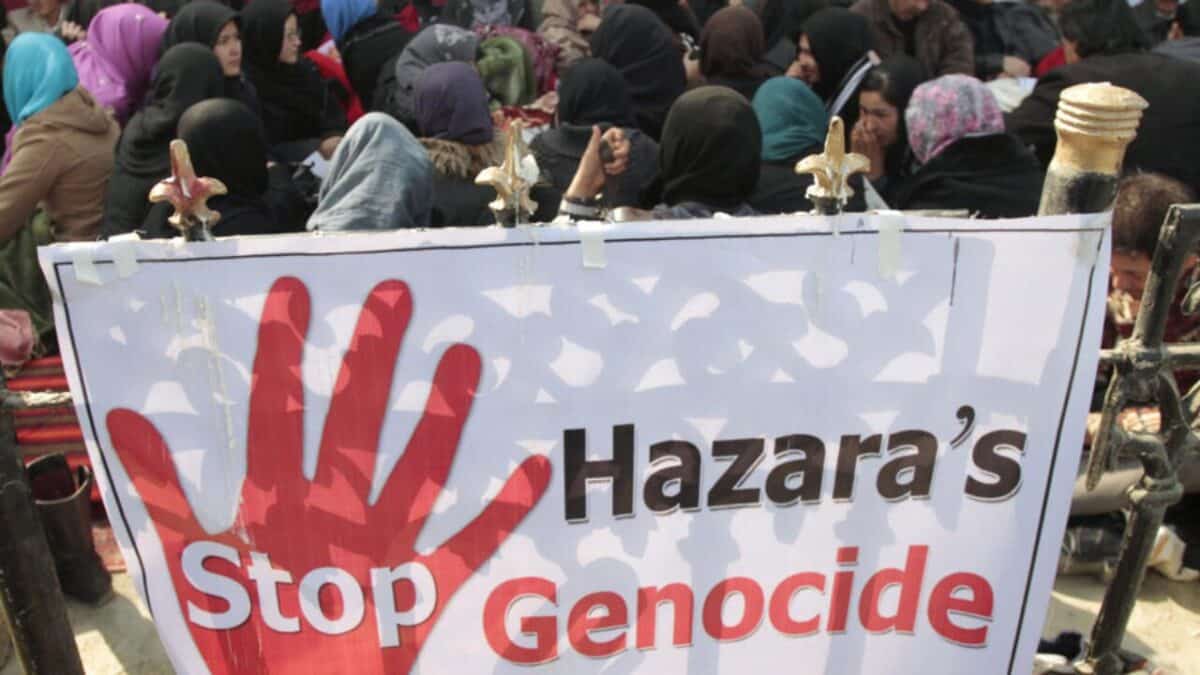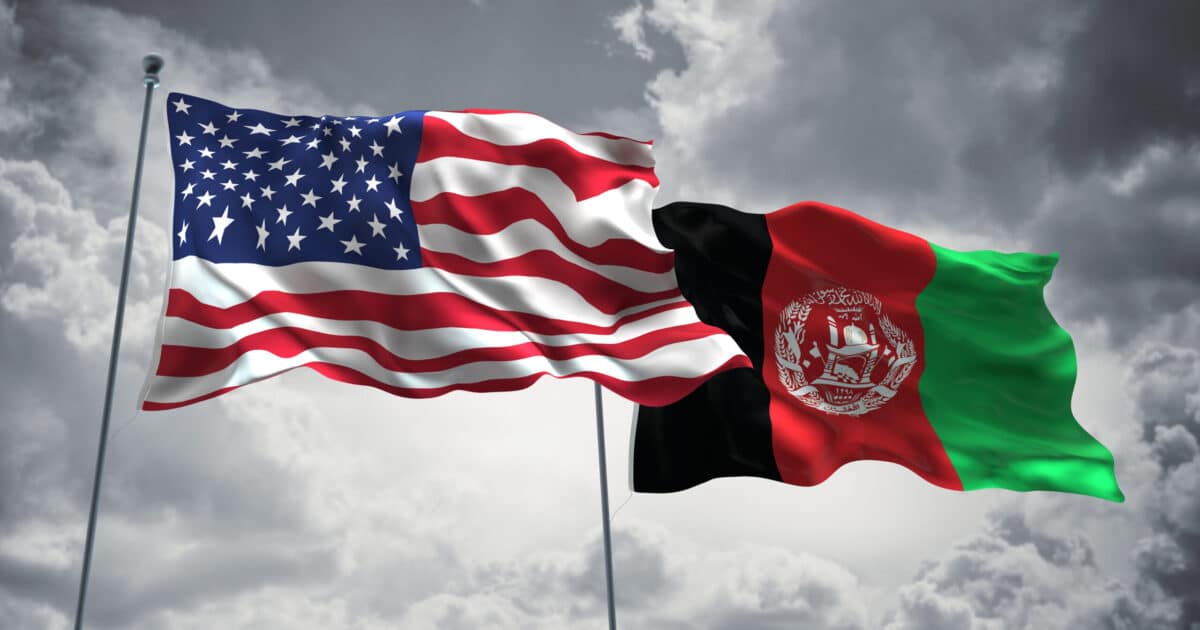
American Bar Association Calls for Action to End Genocide Against Hazaras in Afghanistan
انجمن وکلای آمریکا خواستار اقدام برای پایان دادن به نسل کشی علیه هزاره ها در افغانستان است
انجمن وکلای آمریکا (ABA)، یک انجمن وکلای مستقر در ایالات متحده، قطعنامه ای را تصویب کرده است که از دولت ها خواسته است تا اقدامات نسل کشی بیشتر علیه مردم هزاره در افغانستان را “به رسمیت بشناسند، متوقف کنند و از آن جلوگیری کنند.”
در جریان نشست سالانه خود در شیکاگو در 5 اوت، مجلس نمایندگان ABA قطعنامه 501 را تصویب کرد که از وزارت امور خارجه ایالات متحده می خواهد تا تلاش های عدالت و پاسخگویی را برای پایان دادن به مصونیت از مجازات برای نسل کشی در افغانستان ترویج کند.
این قطعنامه همچنین از کنگره ایالات متحده میخواهد تا چارچوبهای ملی، منطقهای و بینالمللی را برای جلوگیری از جنایات گسترده در افغانستان و حمایت از گروههای در معرض خطر مانند هزارهها تقویت کند.
در این قطعنامه آمده است: «از اواخر قرن نوزدهم، مردم هزاره قربانی اعمال خشونتناپذیر و کشتار جمعی شدهاند که به دست رهبران مختلف که در افغانستان به قدرت رسیدهاند، انجام شدهاند».
هزاره های قومی با سابقه طولانی آزار و اذیت خشونت آمیز، تبعیض و به حاشیه رانده شدن در افغانستان روبرو بوده اند. آنها به عنوان عمدتاً مسلمانان شیعه در یک کشور عمدتاً سنی مذهب، در معرض اشکال مختلف خشونت از جمله حملات و قتل عام هدفمند سیستماتیک قرار گرفته اند که به گفته آنها نسل کشی است.
علاوه بر این، هزاره ها همچنان محرومیت از خدمات اولیه، دسترسی محدود به آموزش و فرصت های شغلی محدود را تجربه می کنند.
بر اساس این قطعنامه، اولین نمونه ثبت شده از خشونت علیه هزاره ها در زمان حکومت عبدالرحمن خان در افغانستان، از سال 1880 تا 1901 میلادی، رخ داد که طی آن تقریباً 60 درصد از جمعیت هزاره قتل عام، برده یا به زور آواره شدند.
در این قطعنامه آمده است: «عبدالرحمن خان هزاره ها را به عنوان «کافر» طبقه بندی کرد و به مردم هزاره تجاوز کرد، کشت و معلول کرد، هزاره جات را خالی کرد و با صدور فرمان های سلطنتی اجازه استفاده مجاز از زمین های هزاره ها را برای چرای احشام شان توسط کوچی های پشتون داد.
این تبعیض و غیرانسانیسازی که توسط خان برای توجیه آزار و شکنجه هزارهها به کار میرفت، مجدداً توسط طالبان در دهه 1990 استفاده خواهد شد. از سال 1992 تا اواخر سال 2001، هزاره ها حداقل ده مورد قتل عام را متحمل شدند که 9 مورد آن را طالبان مرتکب شدند.
قطعنامه چندین جنایات علیه هزاره ها را برجسته می کند: قتل عام در افشار کابل، در جریان درگیری های مسلحانه داخلی میان جناح های مختلف از سال 1992 تا 1993. قتل عام مزارشریف که توسط طالبان در اولین حکومت آنها در سال 1998 انجام شد. و کشتار یکاولنگ در سال 2001 در مرکز بامیان که توسط نیروهای طالبان انجام شد. در هر یک از این رویدادها هزاران هزاره بطور سیستماتیک و وحشیانه اعدام شدند.
از زمان بازگشت طالبان به قدرت، هزاره ها و شیعیان افغانستان با تشدید خشونت، تبعیض سیستماتیک و محرومیت مواجه شده اند. هدف قرار دادن هزاره ها تشدید شده است و بسیاری از حملات پیگرد قانونی ندارند.
در ماه می 2022، ریچارد بنت، گزارشگر ویژه سازمان ملل متحد در امور حقوق بشر در افغانستان، خواستار تحقیق در مورد حملات بر هزاره ها و دیگر گروه های اقلیت در این کشور شد.
او گفت که این حملات “به طور فزایندهای ماهیت سیستماتیک پیدا میکنند و عناصری از یک سیاست سازمانی را منعکس میکنند، بنابراین نشانههایی از جنایات علیه بشریت را به همراه دارند.”
بر اساس قطعنامه ABA، زنان و دختران هزاره به دلیل ماهیت متقاطع خشونت علیه آنان، با وضعیتی خاص مواجه هستند. آنها به دلیل جنسیت و قومیت خود تحت آزار و اذیت شدید قرار می گیرند.
فروش زنان هزاره به بردگی مستند شده است. علاوه بر این، ادعاهایی وجود دارد که خشونت جنسی به عنوان ابزاری برای آزار و اذیت زنان و دختران هزاره استفاده شده است.»
در پایان این قطعنامه از کنگره و وزارت امور خارجه ایالات متحده خواسته شده است که اقدامات فوری انجام دهند و جامعه بین المللی را برای مداخله و توقف آزار و اذیت مداوم و سیستماتیک هزاره ها در افغانستان تحت فشار قرار دهند.
American Bar Association Calls for Action to End Genocide Against Hazaras in Afghanistan
KABUL, AFGHANISTAN – The American Bar Association (ABA), a U.S.-based association of lawyers, has adopted a resolution urging governments to “recognize, stop, and prevent” further acts of genocide against the Hazara people in Afghanistan.
During its annual meeting in Chicago on August 5, the ABA House of Delegates passed Resolution 501, which calls on the U.S. Department of State to promote justice and accountability efforts to end impunity for genocide in Afghanistan.
The resolution further calls on the U.S. Congress to strengthen national, regional, and international frameworks for preventing mass atrocities in Afghanistan and protecting at-risk groups such as the Hazaras.
“Since the late 19th Century, the Hazara people have been victims of unspeakable acts of violence and mass killings committed at the hands of different leaders who have come to power in Afghanistan,” the resolution says.
The ethnic Hazaras have faced a long history of violent persecution, discrimination, and marginalization in Afghanistan. As primarily Shia Muslims in a predominantly Sunni Muslim country, they have been subjected to various forms of violence, including systematic targeted attacks and massacres, which they say constitutes genocide.
Additionally, Hazaras continue to experience exclusion from basic services, limited access to education, and restricted employment opportunities.
According to the resolution, the first recorded instance of brutality against the Hazaras took place during Abdur Rahman Khan’s rule in Afghanistan, from 1880 to 1901, during which approximately 60% of the Hazara population was massacred, enslaved, or forcibly displaced.
“Abdur Rahman Khan classified the Hazara as ‘infidels’ and raped, killed, and maimed Hazara people, he depopulated the Hazarajat, issuing royal decrees to allow authorized use of Hazaras’ lands for grazing their livestock by Pashtun nomads,” the resolution said.
“This discrimination and dehumanization used by Khan to justify the persecution of the Hazara would be used again by the Taliban in the 1990s. Between 1992 and late 2001, the Hazaras endured at least ten cases of massacres, of which the Taliban committed nine,” it added.
The resolution highlighted several atrocities against the Hazaras: the massacre in Afshar, Kabul, during internal armed conflict among various factions from 1992 to 1993; the Mazar-e-Sharif massacre perpetrated by the Taliban during their first rule in 1998; and the 2001 Yakaolang massacre in central Bamyan, carried out by Taliban forces. In each of these incidents, thousands of Hazaras were systematically and brutally executed.
Since the Taliban’s return to power, the Hazaras and Shia of Afghanistan have faced escalated violence, systematic discrimination, and exclusion. The targeting of Hazaras has intensified, with many attacks going unprosecuted.
In May 2022, Richard Bennett, the United Nations Special Rapporteur on Human Rights in Afghanistan, called for an investigation into the attacks on Hazaras and other minority groups in the country.
He said that the attacks were “becoming increasingly systematic in nature and reflect elements of an organizational policy, thus bearing hallmarks of crimes against humanity.”
According to the ABA resolution, Hazara women and girls face a particularly precarious situation due to the intersectional nature of violence against them. They are subjected to intensified persecution because of both their gender and ethnicity.
“Hazara women have been documented being sold into slavery. Further, allegations exist that sexual violence has been used as a tool of persecution against Hazara women and girls,” the resolution said.
The resolution concludes by urging the US Congress and the State Department to take immediate action and to press the international community to intervene and stop the ongoing and systematic persecution of Hazaras in Afghanistan.
Source
- Tags
- Americas



